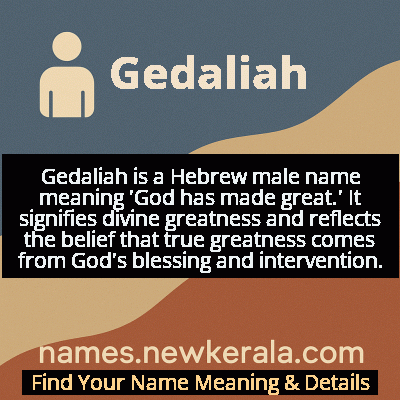Gedaliah Name Meaning & Details
Origin, Popularity, Numerology Analysis & Name Meaning of Gedaliah
Discover the origin, meaning, and cultural significance of the name GEDALIAH. Delve into its historical roots and explore the lasting impact it has had on communities and traditions.
Name
Gedaliah
Gender
Male
Origin
Hebrew
Lucky Number
2
Meaning of the Name - Gedaliah
Gedaliah is a Hebrew male name meaning 'God has made great.' It signifies divine greatness and reflects the belief that true greatness comes from God's blessing and intervention.
Gedaliah - Complete Numerology Analysis
Your Numerology Number
Based on Pythagorean Numerology System
Ruling Planet
Moon
Positive Nature
Diplomatic, friendly, artistic, empathetic.
Negative Traits
Over-sensitive, moody, indecisive, prone to self-pity.
Lucky Colours
Green, cream, white.
Lucky Days
Monday.
Lucky Stones
Pearl, moonstone.
Harmony Numbers
1, 3, 4.
Best Suited Professions
Diplomats, mediators, caregivers, artists.
What People Like About You
Cooperative spirit, friendliness, artistic talent.
Famous People Named Gedaliah
Gedaliah ben Ahikam
Biblical Governor
Appointed governor of Judah by Nebuchadnezzar after the destruction of the First Temple
Gedaliah of Semiatych
Hasidic Rebbe
Founder of the Hasidic dynasty of Semiatych and author of mystical works
Gedaliah Silverstone
Rabbi and Author
Prominent Orthodox rabbi in Washington D.C. and author of Jewish legal works
Gedaliah Bublick
Journalist and Zionist Leader
Editor of Die Wahrheit and active leader in American Zionist movement
Name Variations & International Equivalents
Click on blue names to explore their detailed meanings. Gray names with will be available soon.
Cultural & Historical Significance
Throughout Jewish history, the name has been associated with leadership, tragedy, and the complex dynamics of Jewish survival under foreign rule. The story serves as a cautionary tale about internal conflict and the importance of unity within the Jewish community. In later centuries, the name was adopted by various Jewish scholars and leaders, particularly in Eastern European Jewish communities, where it maintained its connection to traditional values and historical consciousness. The continued use of the name represents a living link to this pivotal moment in Jewish history.
Extended Personality Analysis
Individuals named Gedaliah are often perceived as having strong leadership qualities combined with deep spiritual conviction. They tend to be thoughtful, principled individuals who approach decisions with careful consideration and moral integrity. The historical association with governance and tragic leadership suggests someone who may bear significant responsibilities with grace but also faces complex challenges. Gedaliahs are typically seen as bridge-builders—people who can navigate between different groups or perspectives while maintaining their core values.
These individuals often exhibit a blend of practical wisdom and spiritual depth, making them natural counselors or community leaders. However, the name's historical context also suggests potential challenges with trust and the burden of leadership decisions. They may be perceived as carrying a certain gravitas or historical weight in their personal demeanor. At their best, Gedaliahs demonstrate resilience, faithfulness to tradition, and the ability to make difficult decisions under pressure. They often possess a strong sense of duty and commitment to their communities or causes.
Modern Usage & Popularity
In contemporary times, Gedaliah remains primarily used within traditional Jewish communities, particularly among Orthodox and Conservative Jews who value biblical names with historical significance. The name has never achieved widespread popularity in mainstream Western culture, maintaining its status as a distinctive and traditional Hebrew name. It is most commonly given to boys in religious Jewish families, often those with a particular appreciation for Jewish history or biblical narratives. The name's usage has remained relatively stable but limited over the past century, with occasional revivals in communities emphasizing traditional naming practices. In Israel, while not among the most popular names, it maintains a presence particularly in religious circles and among families with strong historical consciousness. The name's association with the Fast of Gedaliah ensures its continued recognition within Jewish liturgical contexts.
Symbolic & Spiritual Meanings
Gedaliah symbolizes the complex interplay between divine providence and human agency, representing how greatness bestowed by God must be navigated through human wisdom and sometimes tragic circumstances. The name carries connotations of leadership under duress, the weight of responsibility, and the delicate balance between maintaining tradition and adapting to changing political realities. Symbolically, it represents the idea that greatness from God often comes with significant challenges and responsibilities. The name also embodies the theme of Jewish resilience—the ability to maintain identity and faith even in the face of destruction and exile. It serves as a reminder that leadership often involves making difficult choices in impossible situations, and that historical memory can shape identity across generations. The symbolic meaning extends to concepts of restoration after tragedy and the ongoing tension between ideal governance and practical political realities.

